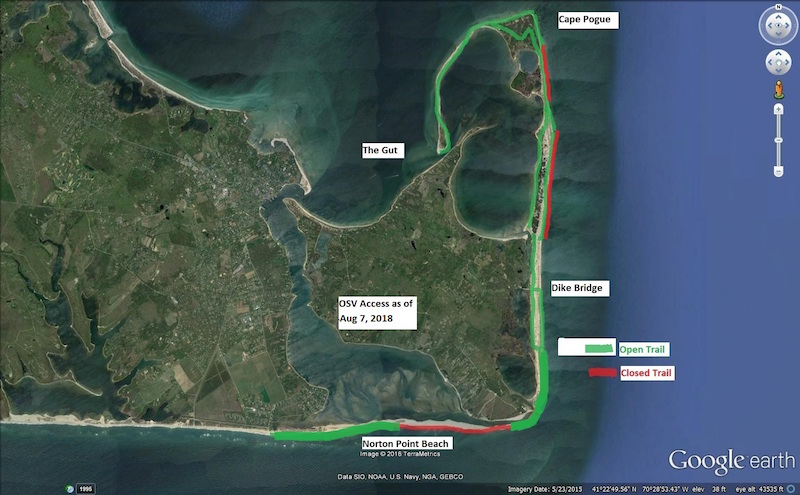Two piping plover nests have caused unusually long closures at Norton Point Beach this season, leading to crowding and the need to turn away some vehicles at times, Trustees of Reservations stewardship manager Chris Kennedy said Friday.
“We had birds spread out along the length of Norton Point this year,” he said. The beach normally has a capacity of about 500 vehicles, but for much of the summer, that number has been limited to around 70.
“It was almost like being on the ferry because the other vehicle was right next to you door to door,” Mr. Kennedy said of the beach, where people typically deflate their tires, drive on and tailgate. “It’s not really what you’d call a great beach experience.”

Nests have often caused summer closures along the beach connecting Chappaquiddick to the mainland, but Mr. Kennedy said plovers in the area are usually fledged by the end of July.
“I think there’s a general willingness to grant the birds the necessary space they need,” he said. “But people are starting to chafe at duration of the closures.”
One of the two nests is located along the portion of the beach between Chappy and the mainland. Another is located on Chappaquiddick closer to Cape Pogue Bay. Mr. Kennedy said the chicks on Chappy are very close to flying. But the other chick on Norton Point Beach is unlikely to be fledged, or able to fly, for at least another week.
Piping plovers are considered threatened by both the state and federal governments. According to the state’s endangered species program, there are currently less than 10,000 adult plovers in the world. When they nest, plover eggs take about a month to incubate. After chicks hatch, they have another 30 to 35 days of development before they can fly. The chicks are born precocious, which means they feed themselves. During those two months, human interference must be kept at a minimum according to state law.
“We have to allow a 100-yard bumper between the closest vehicle and the closest chick,” Mr. Kennedy said.
On Thursday this week, representatives from the state’s Natural Heritage and Endangered Species Program met with fisherman and others to talk about the plover-related closures. Mr. Kennedy said though the meeting was tense, he is hopeful the state may relax some requirements to allow vehicles to drive near the nests to reach other parts of the beach next summer.
“The state is doing what it can do to be as flexible as possible,” Mr. Kennedy said. “But they made it clear that their priority is protection of wildlife species.”







Comments (1)
Comments
Comment policy »